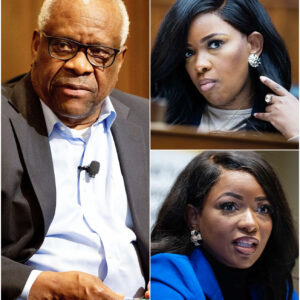The Unfiltered Exchange: Jasmine Crockett vs. Jimmy Kimmel
In the world of late-night television, humor often walks a fine line between light-hearted banter and serious discourse. Recently, a segment on “Jimmy Kimmel Live!” showcased this dynamic in a way that left audiences both entertained and contemplative. The exchange between Kimmel and Congresswoman Jasmine Crockett was not just a moment of awkwardness; it was a reflection of the evolving landscape of political discourse in the media.
Jimmy Kimmel, known for his sharp wit and comedic timing, attempted to lighten the mood with a joke about Crockett’s fake eyelashes during a discussion about her viral moment with Congresswoman Marjorie Taylor Greene. Kimmel likely expected a chuckle or a playful retort, but what he received was a masterclass in composure from Crockett. Instead of laughing, she delivered a look that could only be described as a “try again” stare, reminiscent of the disapproving gaze a mother gives her child in public when they misbehave.
The atmosphere in the studio shifted dramatically. Kimmel’s jovial demeanor faltered as he realized that Crockett was not there to play the role of the good sport. She was there to engage in a serious conversation, and she was not going to let a poorly timed joke derail that.
Crockett’s response to Kimmel’s joke was not just a simple dismissal; it was a thoughtful explanation of the context surrounding her viral moment. She recounted how the congressional hearing had been delayed due to Greene’s attendance at Donald Trump’s trial in Manhattan. This delay had left Crockett and her colleagues waiting, frustrated, and ready to address serious issues. Instead, Greene chose to focus on personal jabs rather than the matter at hand.
Crockett’s calm yet assertive demeanor was striking. She articulated her thoughts clearly, explaining that her viral takedown of Greene was not a spontaneous quip but a well-considered response to a frustrating situation. The audience, initially expecting light-hearted banter, found themselves drawn into a deeper conversation about the responsibilities of public officials and the importance of addressing substantive issues rather than engaging in petty squabbles.
As Crockett continued to speak, the tone of the segment shifted from comedic to serious. Kimmel, recognizing the gravity of the conversation, refrained from interrupting. He asked if Greene’s behavior irritated even her own party, to which Crockett responded candidly, “Her people don’t like her either.” This moment resonated with the audience, highlighting the discontent within political circles regarding Greene’s antics.
When Kimmel pressed further, asking if Greene was the “dumbest person in the house,” Crockett’s response was sharp and unfiltered: “I’d be hard-pressed to find someone dumber.” This line, delivered without hesitation, encapsulated the essence of the moment. It was a reminder that political discourse can be both serious and candid, and that sometimes, the truth is more powerful than a punchline.
What transpired during that segment was more than just an awkward exchange; it was a reflection of a cultural shift in how political figures engage with the media. Crockett’s refusal to play along with Kimmel’s humor demonstrated a growing trend among politicians who are increasingly unwilling to tolerate jokes at their expense, especially when those jokes detract from serious issues.
Kimmel, who has faced his share of controversies in the past, seemed to recognize the need for a more respectful approach. His attempts to reset the conversation with questions about Crockett’s future were met with her unwavering focus on substantive issues. “I’m focused on being effective, not just viral,” she stated, a line that resonated deeply with viewers.
This moment was significant not only for its content but also for its delivery. Kimmel, known for his comedic prowess, found himself in a position where humor was not the appropriate response. The silence that followed Crockett’s remarks spoke volumes, indicating a collective understanding that the conversation had shifted from entertainment to education.
The exchange between Jasmine Crockett and Jimmy Kimmel serves as a powerful reminder of the importance of authenticity in political discourse. In an era where sound bites and viral moments often overshadow substantive discussions, Crockett’s calm and collected demeanor stood out. She was not there to entertain; she was there to educate and advocate for real issues.
As the segment concluded, it became clear that Kimmel had been outmatched in a way that was both refreshing and necessary. The audience witnessed a moment of political clarity that transcended the typical late-night format. It was a reminder that sometimes, the most impactful conversations happen when humor takes a backseat to honesty and integrity.
In a world where fake eyelashes and courtroom sass can dominate headlines, Crockett’s message was clear: there are more pressing issues at hand, and it’s time to focus





